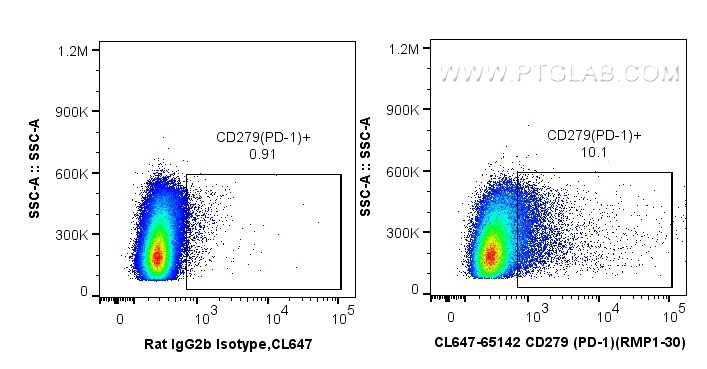CoraLite® Plus 647 Anti-Mouse CD279 (PD-1) (RMP1-30)
CD279 (PD-1) Monoclonal Antibody for FC
Host / Isotype
Rat / IgG2b, kappa
Reactivity
Mouse
Applications
FC
Conjugate
CoraLite® Plus 647 Fluorescent Dye
CloneNo.
RMP1-30
Cat no : CL647-65142
Synonyms
Validation Data Gallery
Tested Applications
| Positive FC detected in | Con-A stimulated BALB/c mouse splenocytes |
Recommended dilution
| Application | Dilution |
|---|---|
| This reagent has been pre-titrated and tested for flow cytometric analysis. The suggested use of this reagent is 5 µl per 10^6 cells in a 100 µl suspension or 5 µl per 100 µl of whole blood. | |
| Sample-dependent, check data in validation data gallery | |
Product Information
CL647-65142 targets CD279 (PD-1) in FC applications and shows reactivity with Mouse samples.
| Tested Reactivity | Mouse |
| Host / Isotype | Rat / IgG2b, kappa |
| Class | Monoclonal |
| Type | Antibody |
| Immunogen | Mouse PD-1 transfected BHK cells |
| Full Name | programmed cell death 1 |
| GenBank accession number | BC119179 |
| Gene symbol | Pdcd1 |
| Gene ID (NCBI) | 18566 |
| Conjugate | CoraLite® Plus 647 Fluorescent Dye |
| Excitation/Emission maxima wavelengths | 650 nm / 665 nm |
| Form | Liquid |
| Purification Method | Affinity purification |
| Storage Buffer | PBS with 0.1% sodium azide and 0.5% BSA, pH 7.3. |
| Storage Conditions | Store at 2-8°C. Avoid exposure to light. Stable for one year after shipment. |
Background Information
Programmed cell death 1 (PD-1, also known as CD279) is an immunoinhibitory receptor that belongs to the CD28/CTLA-4 subfamily of the Ig superfamily. It is a 288 amino acid (aa) type I transmembrane protein composed of one Ig superfamily domain, a stalk, a transmembrane domain, and an intracellular domain containing an immunoreceptor tyrosine-based inhibitory motif (ITIM) as well as an immunoreceptor tyrosine-based switch motif (ITSM) (PMID: 18173375). PD-1 is expressed during thymic development and is induced in a variety of hematopoietic cells in the periphery by antigen receptor signaling and cytokines (PMID: 20636820). Engagement of PD-1 by its ligands PD-L1 or PD-L2 transduces a signal that inhibits T-cell proliferation, cytokine production, and cytolytic function (PMID: 19426218). It is critical for the regulation of T cell function during immunity and tolerance. Blockade of PD-1 can overcome immune resistance and also has been shown to have antitumor activity (PMID: 22658127; 23169436).
Protocols
| Product Specific Protocols | |
|---|---|
| FC protocol for CL Plus 647 CD279 (PD-1) antibody CL647-65142 | Download protocol |
| Standard Protocols | |
|---|---|
| Click here to view our Standard Protocols |


